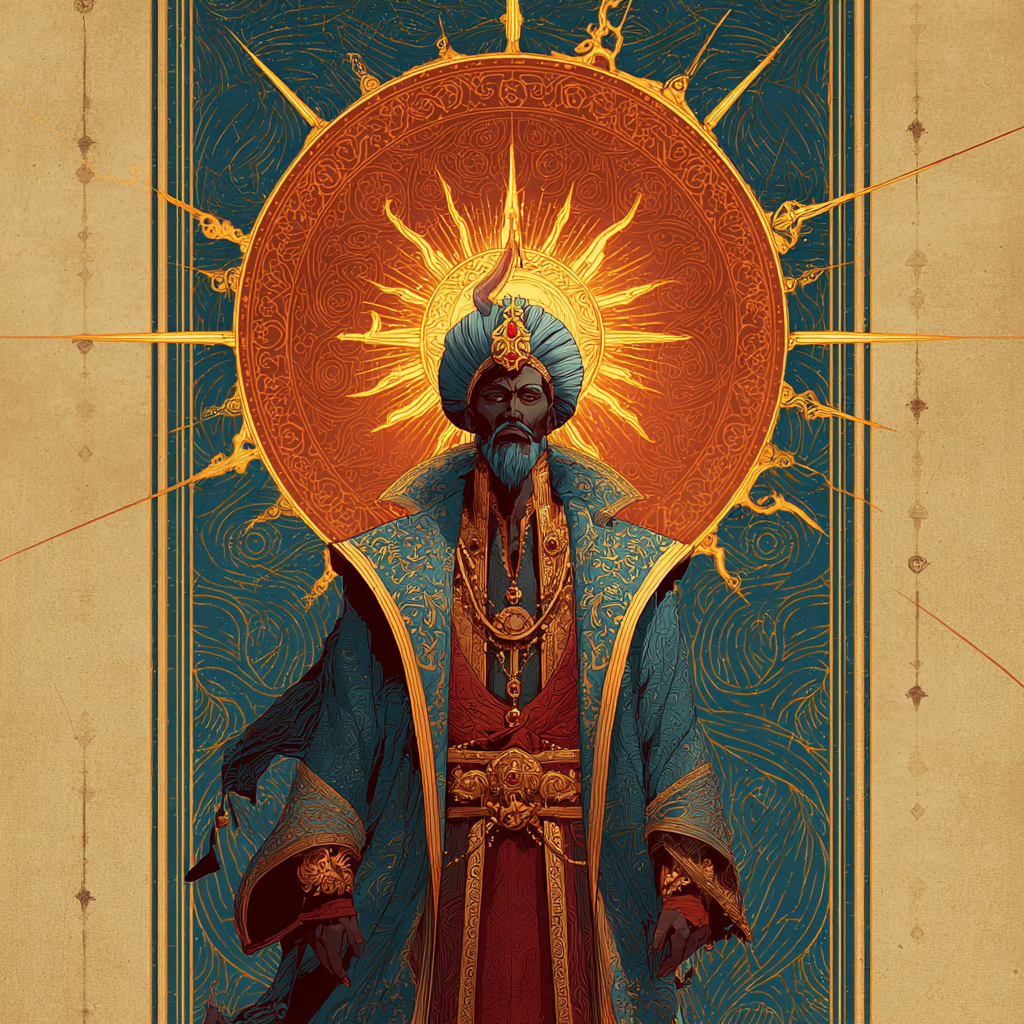The Sun Sultan
Summary
In the time of the Jantani Desert youth, when the sands young sands sang with the breath of the wind and the blue sky shimmered like a silver forge, a child was born beneath the fiercest sun in living memory. The tribes called that day Salan il-Aflan, “The Day the Burning Sky,” when the sun flared white and the sands baked hard as hot coals. It was said that no shadow touched the earth that day, only light and the promise of destiny. The child would be born into a wandering tribe that learned the ways of the desert to survive. His mother, Ashara of the Flaming Veil, was said to have drunk a tear of the sun that fell from the sky when its flames came closest to the earth, as a plea for aid when she was told that her child would not survive their birth. She labored alone, as the tear of fire burning within was too powerful for anyone to approach without being burned; her cries of pain echoed across the dunes as the sun's light grew more intense with her to foretell the coming of her child's birth.
When her son took his first breath, the sun would vanish, bringing about night, yet the day would not end as the child glowed with its light to banish the darkness. His skin bore the hue of burnished copper and his eyes shimmered gold like sunstone with legends claiming that when the boy opened his eyes, the water of an oasis near him vanished from his sight, the boy was named Solan-Alim, “The Sun Made Flesh," with Dune Mystics journeying four days nights without sleep to witness the child and proclaim a prophecy of his arrival: “He shall not bow to shadow nor thirst beneath the heavens. Where he treads, fire shall not harm him, and no mirage shall fool his sight. The sun is not his master, but his herald.”
From infancy, Solan-Alim exhibited a profound connection with the sun’s rhythms. He walked barefoot upon searing dunes without pain, danced under the noonday blaze as if it cooled him, and once, it is said, he called down a shaft of sunlight to ignite a dying fire pit with a single chant. Nor did he have a shadow that followed him under the sun. The desert tribes took notice as nomadic lords and warrior-mystics came bearing salt, incense, and ancestral blades to swear fealty to the boy born with the sun, growing not in isolation, but among sandriders, singers, herders, and assassins of the sands. Each gifted him in the ways of the desert, how to read the wind like a map, how to speak with Spirits, and how to rule not with fear, but with radiance.
He would guide his people through the desert, bringing them to fresh water and shielding them from all harm. As he grew, he saw a vision of what was to become of his fate and that of his people, guiding them out of the harsh sands towards the bountiful sea, where they would find comfort and peace. In the years that followed his journey, he would face many threats from Dark Spirits, demons and wicked men alike that sought to stop his vision from coming to pass. At seventeen, Solan-Alim would finally reach the sea with his people but would face one final challenge: the reigning tyrant of the dark abyss, a cruel monster known as Drarha, who claimed rulership over the sea and drowned all that came near it. Solan walked right into the sea and appeared at the gates of the obsidian palace clad in nothing but darkness. The sunlight fading into the depths as he approached, only to blaze anew behind him, casting his silhouette like a god. His words rang out: “You have ruled through fear. I shall rule through fire, step down, or be swallowed by it.”
Drarha laughed and burst into flame, with Solan not raising a hand. The water receded around him, and with it, he would return to his people proclaim that birth of the first city that he would call Akbar. From that day, Solan-Alim was named The Sun Sultan, a title not given, but reborn into. His rule would be just as wise, forging an empire remembered as the Paranth Sultanate, which would bring prosperity for generations to come. He did not conquer with armies, but with justice, water, and wisdom, and wherever he walked, old feuds died, springs returned, and light banished cruelty. He was said to have ruled for centuries with his light, and then the time came when he decided to leave his throne.
When his people asked why he would leave them, he smiled and said: “I was not born to build empires of stone, I was born to teach the desert to bloom.” He recounted the vision that had told him of his fate all those years ago, yet there was more to it than he had said to any other soul at that time. His destiny had far greater plans for him than just ruling over a vast empire, and his time in it was coming to an end. He would set his affairs to ensure that the sultanate was in good hands, with his chosen successor being his only son, Holim-Sar, to rule in his father's place. Then, at dawn on the hottest day of the year, Solan-Alim walked alone into the horizon, where the sky burned gold. He did not return, but some say he still walks with the sun, watching, waiting, until a time of great crisis emerges, and his people need him once more.




Comments